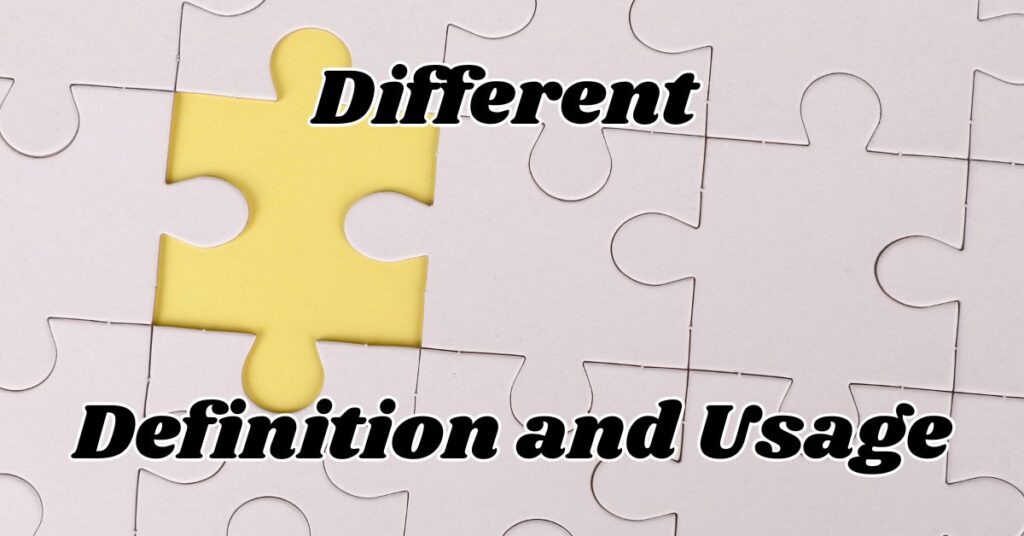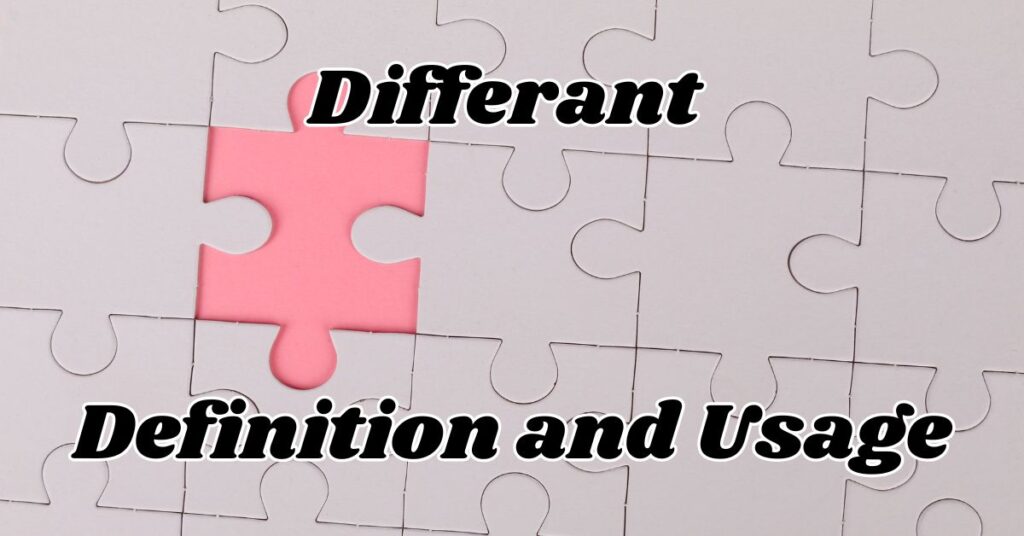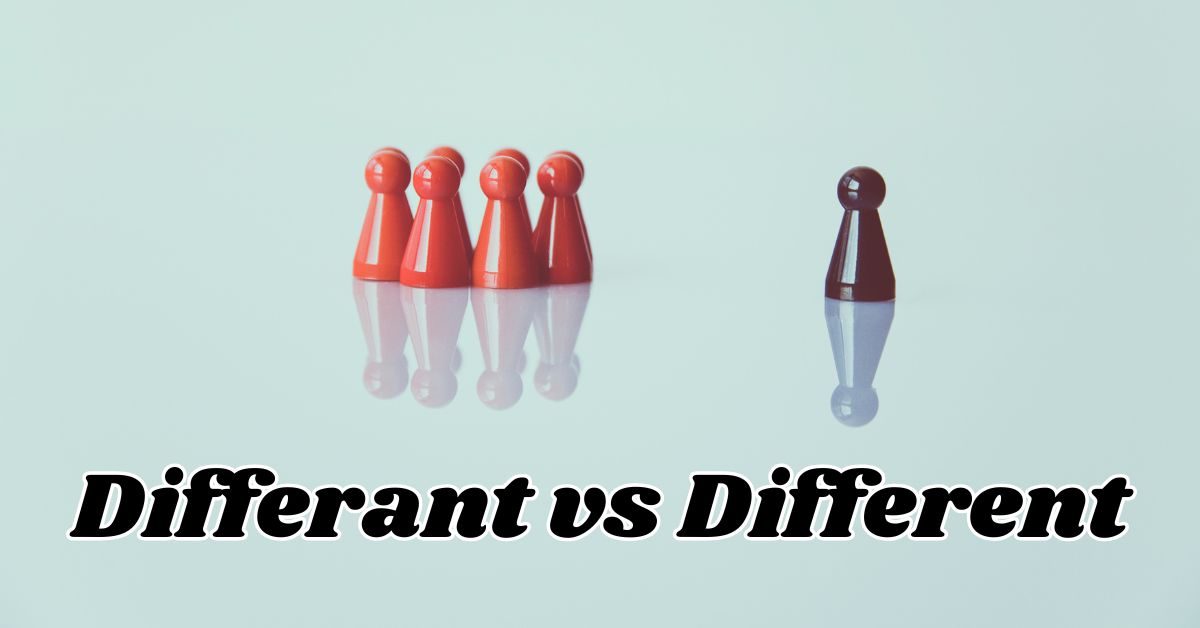Differant vs Different is a common point of confusion in the English language. This seemingly minor spelling error can trip up even experienced writers, highlighting the importance of accurate spelling and proper grammar.
The phonetic confusion between “differant or different” makes it a classic example of a common mistake. This article will definitively answer the question of what’s the difference, explaining why “differant” is an incorrect spelling and “different” is the only correct spelling.
We’ll delve into the meaning and usage of “different,” exploring its role in communication and how it functions within English grammar. We’ll also briefly touch on how text analysis and sentiment analysis, using machine learning, can help identify and correct such errors.
Quick Summary
“Differant” is a misspelling. The proper spelling is “different.” “Different” describes something that is not the same as another. It’s a fundamental word in the English language, used to express comparison, contrast, and the act of differentiating. Understanding its correct usage is crucial for clear and effective communication.
Understanding Differant vs Different
The confusion between “differant and different” arises primarily from their similar pronunciation. This phonetic confusion leads many to believe “differant” is a valid alternative.
However, “differant” is simply a misspelling of “different.” Understanding the correct spelling is crucial for clear communication.
This common error highlights the importance of proofreading and utilizing resources like dictionaries and AI grammar tools to ensure accurate spelling in all forms of writing. Remember, consistent use of the correct spelling enhances credibility and professionalism.
Origins of the Word Different
The word “different,” dating back to the late 14th century, originates from the Old French “different” and ultimately the Latin “differentem,” meaning “differing.” It signifies a lack of sameness, encompassing variations in nature, quality, and state.
Derived from “differre,” meaning “to set apart,” its roots trace back to the PIE root “*bher-,” signifying “to carry.” By the early 20th century, “different” also acquired the colloquial connotation of “special” or “out of the ordinary.” This evolution highlights the dynamic nature of language.
Different: Definition and Usage

“Different” is a versatile word with multiple meanings. It signifies not being the same as another or each other, implying a distinction or variation. It can also denote something unusual or special.
Understanding the nuances of “different” is essential for effective communication. This understanding extends to recognizing how “different” functions grammatically, which we’ll explore further.
Mastering the usage examples of “different” in various contexts will solidify your understanding of this important word.
Different Definition
“Different” primarily means not the same. It describes a lack of similarity or a departure from a standard. This can apply to physical attributes, characteristics, ideas, or anything that can be compared.
The definition extends to encompass the concept of uniqueness or distinction. For instance, “These two paintings are different” implies a visual distinction, while “They have different opinions” refers to a divergence in thought.
Different Usage
“Different” typically functions as an adjective, modifying nouns. It can also be used in comparative constructions like “different from” or “different than.” Understanding its grammatical role is key to constructing correct sentences.
For example, “She wore a different dress” uses “different” as an adjective, while “My approach is different from yours” employs the comparative construction. Paying attention to sentence context is crucial for accurate usage.
Uses of “Different” In a Sentence
- The flavors of the two ice creams were different.
- She has a different perspective on the situation.
- This year’s conference is different from last year’s.
- They come from very different backgrounds.
- My opinion is different than yours.
Synonyms of Different
- Distinct
- Unique
- Dissimilar
- Varying
- Divergent
- Unlike
- Diverse
- Separate
- Individual
- Particular
Differant: Definition and Usage

“Differant” is not a recognized word in the English language. It is a misspelling of “different.” Therefore, “differant” has no valid definition or usage. This common error likely stems from the similar pronunciation of the two words.
It’s crucial to remember that only “different” is the correct spelling and should be used in all contexts. Using “differant” can detract from the credibility of your writing.
Differant Definition
“Differant” has no definition. It is not a recognized word in the English language and is considered a misspelling of “different.”
While some may use it due to phonetic confusion, it’s crucial to understand it carries no meaning and its use should be avoided. Using “differant” can detract from the clarity and professionalism of your writing.
Differant Usage
“Differant” should never be used in any context. Its status as a misspelling makes it unsuitable for both formal and informal writing.
Relying on spelling check tools and practicing the correct spelling of “different” will help eliminate this error from your writing. Remember, effective communication relies on using the proper spelling of words.
Uses of “Differant” In a Sentence
- The colors are differant. (Incorrect) The colors are different. (Correct)
- They have differant opinions. (Incorrect) They have different opinions. (Correct)
- This is a differant approach. (Incorrect) This is a different approach. (Correct)
- The results were differant. (Incorrect) The results were different. (Correct)
- We need a differant strategy. (Incorrect) We need a different strategy. (Correct)
Side by Side Comparison
| Feature | Differant (Incorrect) | Different (Correct) |
| Status | Misspelling | Correct English word |
| Definition | No recognized definition | Not the same; dissimilar |
| Usage | Should not be used in any context | Used as an adjective to describe something that is not the same |
| Grammatical Role | None | Adjective |
| Examples | The colors are differant. (Incorrect) | The colors are different. (Correct) |
Everyday Usage Examples
Everyday language is rife with examples of “different.” We say things like, “That’s a different story,” or “I’m looking for a different shirt.” These examples illustrate the word’s common usage in daily conversation.
Paying attention to how “different” is used in spoken language can improve your understanding of its correct application in writing. Analyzing these sentence examples can reveal nuances in meaning and context.
Examples Of Different In a Context
- “I’m looking for a different shirt.”
- “The weather is different today.”
- “We need to find a different solution.”
- “They speak a different language.”
- “That’s a different story.”
Examples Of Differant In a Context
- “I want a differant car.” (Incorrect) “I want a different car.” (Correct)
- “This tastes differant.” (Incorrect) “This tastes different.” (Correct)
- “They have differant ideas.” (Incorrect) “They have different ideas.” (Correct)
- “We went to a differant restaurant.” (Incorrect) “We went to a different restaurant.” (Correct)
- “She wore a differant dress.” (Incorrect) “She wore a different dress.” (Correct)
Common Mistakes To Avoid
One common mistake is using “differant” instead of “different.” This error, rooted in phonetic confusion, can be easily avoided by remembering the correct spelling. Another mistake is using “different” when “unique” or “distinguishable” might be more appropriate.
Understanding the subtle differences between these words is key to precise language use. For instance, “unique” implies being one-of-a-kind, while “distinguishable” suggests being easily recognized as distinct.
Using “Differant” Instead Of “Different”
The most common mistake is substituting “differant” for “different.” This is a simple spelling error, likely due to similar pronunciation. Remember, “different” is the only correct spelling. Double-check your writing and use spell-check tools to avoid this error.
Using “Different” When “Distinguishable” Is More Appropriate
While both words relate to dissimilarity, “distinguishable” emphasizes the ease of recognizing a difference. If the difference is readily apparent, “distinguishable” might be a more precise choice than simply “different.”
Using “Different” When “Unique” Is More Appropriate
“Unique” signifies being one-of-a-kind, while “different” simply means not the same. If something is truly singular and unparalleled, “unique” is the more accurate and impactful word choice.
Tips To Avoid These Mistakes
- Proofreading: Always proofread your work carefully.
- Spell Check: Utilize spell check tools.
- Dictionary: Consult a dictionary when unsure.
- AI Grammar Tool: Use an AI grammar tool or English grammar checker for grammar correction, spelling check, and punctuation check.
- Sentence Revision: Practice sentence revision to improve your sentence construction.
More Article: Sweeped vs Swept: What’s the Difference
FAQ’s:Differant vs Different
Is it Differant or Different?
It’s always different; “differant” is a misspelling. Use “different” for accurate and professional writing.
How do you use different?
“Different” functions as an adjective, modifying nouns, and in comparative constructions like “different from.” For example: “a different approach” or “different from the norm.”
Is different from grammatically correct?
Yes, “different from” is grammatically correct and preferred in formal writing. While “different than” is sometimes used, “different from” is generally considered more standard.
Conclusion
Differant vs Different, the answer is definitive: different. “Differant” is a common misspelling stemming from phonetic confusion, but it’s crucial to remember the correct spelling for clear and professional communication.
Mastering this seemingly small detail significantly impacts the credibility of your writing. So, banish “differant” from your vocabulary and embrace the power of the correctly spelled “different” to express distinctions, variations, and uniqueness with confidence. Remember, accurate spelling is a cornerstone of effective writing.
Related Post: Coach vs Couch: What’s the Difference?

